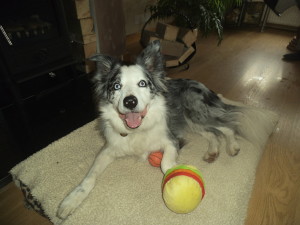Velcro Dogs – Why Is My Dog Clingy?
At Holidays4Dogs, we know one of the greatest things about owning a dog is the special bond that can be created. However, sometimes having a constant four-legged shadow can be troublesome. In this article we ask – why do some of our canine pals follow us around so doggedly? If you have a clingy dog, read on to find out more.
Some experts suggest, a dog who follows its owner around, may be a nervous, or insecure, dog. While this may be true of some individual dogs, many dogs stick to their owners like glue simply because they enjoy being close to them.
Scientists have already found that dogs have particular brain responses to the sound of human voices. In tests voices – especially happy sounding tones of voice – light up specific brain areas in dogs – just as they do in humans, in fact. If you talk and chat to your dog a lot, this may well account for why he likes to spend so much time with you.
In other canine behaviour studies carried out with packs of free ranging dogs, it was found that members of the pack were more inclined to follow the friendliest dog.
As well as this, dogs communicate mostly when they are up close and personal. In addition, dogs depend very much on their social group for food and protection. Therefore, it is beneficial to closely stick together. Many dogs will do this with their owners and are often referred to as ‘velcro’ dogs after the well-known product.
What is a ‘Velcro’ dog?
 A ‘Velcro dog’ is a term coined to describe the dog that is extremely attached to his, or her, owner. Some breeds tend to be ‘clingier’ than others. Border collies, for example, are always ready for action and never tire of activity. As a result, they are highly tuned to every movement their owners make.
A ‘Velcro dog’ is a term coined to describe the dog that is extremely attached to his, or her, owner. Some breeds tend to be ‘clingier’ than others. Border collies, for example, are always ready for action and never tire of activity. As a result, they are highly tuned to every movement their owners make.
As well as this, they have a really strong herding instinct and this can often include ‘herding’ their owners in addition to other moving targets such as other pets, or even traffic.
Dogs bred specifically as lap dogs often have a huge attachment to their owners. Chihuahuas, for instance, were once considered as living hot water bottles. Older dogs, too, often develop a deeper attachment to their owners due to failing eyesight, or hearing.
Dogs who follow their owners constantly, may be susceptible to separation anxiety. In the absence of their owner, some dogs may lose the plot when left alone in the house. However, not all clingy dogs show signs of separation anxiety.
Broadly speaking, dogs that frequently follow their owners about are displaying pretty normal behaviour – even though having a velcro dog can sometimes be a little tiresome for owners.
The majority of dog owners don’t mind their dogs following them around. After all, it makes us feel loved and wanted. However, there may be times when you would prefer your dog not be to constantly at your heels.
Here’s some tips to encourage your dog to stop following.
Train your dog to stay and settle – either on his own mat, or wherever you want him to wait – for instance, while you go into another room briefly or, into the kitchen to make drink. Start the stay exercises with you in the same room as the dog and gradually increase your distance.
If your dog has enough energy to be constantly at your heels he may need more physical, or mental, activity. Provide food filled toys and/or take him on longer walks.
Reinforce the idea that being further away from you is just as much fun. Retrieve, or scent games, will help your dog to see he can have great fun without being permanently glued to you.
Conclusion.
If you don’t mind your dog constantly following you, then that’s fine. However, if there are times when you find the behaviour annoying, there is nothing wrong with setting a few boundaries.
Just remember not to change the rules too quickly and always use positive reinforcement to make changes. Shutting your dog away from you, for instance, may actually create anxiety in the dog, that wasn’t there before.
If you prefer your dog not to follow you into the kitchen, teach him to stay behind the threshold and reward him for staying in the right spot.
Dogs make the most wonderful companions and comforters. We should feel blessed that they seem to want to be with us as much as possible.


